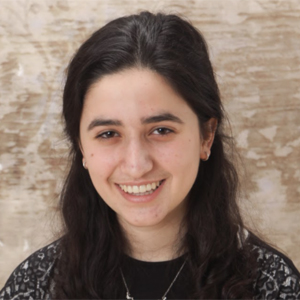Jul 2, 2020 By: yunews
 Sarah Engel
Sarah EngelWhat was your Jewish education like as you grew up? I attended a local Modern Orthodox day school from the first grade onward. It was blessed with students from a range of religious backgrounds, from unaffiliated to Modern Orthodox. What convinced you to attend YU? I was drawn to YU for the fact that it offered an incredible religious environment with rigorous Torah offerings. How would you describe your time at YU in general? My time at YU was a journey of discovery. I have gained so much academically, developed incredible friendships and challenged myself religiously. Looking back on the past three years, I have tremendous hakaras hatov [gratitude] for everything YU has given me, including the opportunity to further my growth as a Jew. What is your major and why did you choose it? I have dreamed of making aliyah [emigration to Israel] for many, many years and wanted to choose a major that would give me a transferable skill set for the Israeli job market. I originally had a double major in computer science and Jewish education and have a deep passion for both. But both happen to be extremely rigorous majors. So after two years, I ultimately made the challenging decision, with the help of many incredible mentors and professors, to switch to a computer science and Jewish studies major, focusing more on content as opposed to pedagogy for my final year in Stern. How and why did you become involved in MafTeach? When I decided to switch from Jewish education to Jewish studies, I realized I needed to keep my foot in the “pedagogy” door. I adore thinking about education and how to effectively reach students and design creative educational programs. I decided to apply for MafTeach as an additional supplement to my education, so that even as a Jewish Studies major, I could keep learning about pedagogy and get classroom experience. Was there an “ah ha” moment that you experienced? The MafTeach program definitely gave me incredible opportunities to see so much of what I had studied come into fruition in the classroom in a well-executed and effective way. Seeing the effectiveness of solid classroom routines and procedures, of effusive and warm educators and intentionally designed creative classroom spaces all happening, and happening well, in practice was tremendously inspiring. It solidified the legitimacy of so much of the theory I have studied. What did you learn about the Jewish community that you did not realize before? As a MafTeach Fellow in Los Angeles, I was exposed to a lot of diversity within the religious community. What was unique about Los Angeles was the tremendous diversity within the Orthodox community in terms of different minhagim [religious customs] and practices. We met with Modern Orthodox, Lubavitch, Persian, Sephardi and Carlebach-inspired Jews, who were all orthodox and who all called Los Angeles their community. Walking the streets on Shabbat and seeing so many others out walking as well—some in black hats, some in Chassidic garb, some in other clothing—was very cool for me. What are your next steps? I am not sure where my career will take me. I am deeply passionate about Jewish education and want it to remain a huge focus of my life in some way. For the immediate future, I plan on further developing my computer science skills. I just wrote my thesis on an interdisciplinary approach to teaching middle schoolers Talmud using programming principles I designed last summer as a software engineering intern at Sefaria, which is an open source digital library of Jewish texts. For me, computer science is not an end unto itself; rather, it is a set of highly effective analytical tools that one day I hope to use for the betterment of the community. What would you say to a YU student who is considering applying to the MafTeach program? If you want exposure to new communities, to learn a little bit of the “why” behind education and be in a cohort of incredibly passionate, driven and motivated students deeply invested in the future of the Jewish community, definitely apply.
